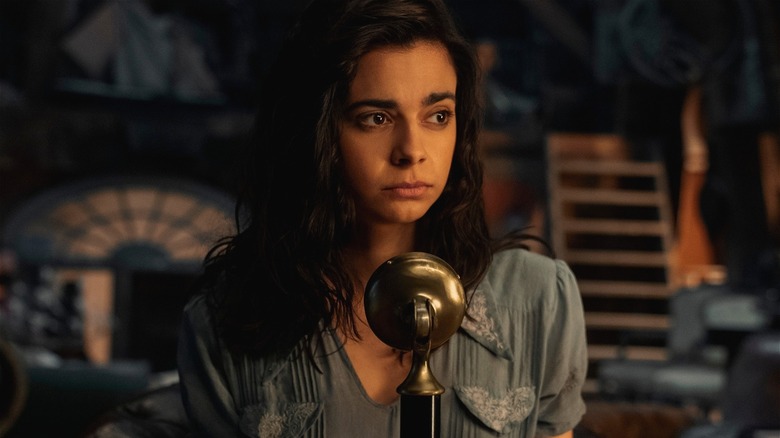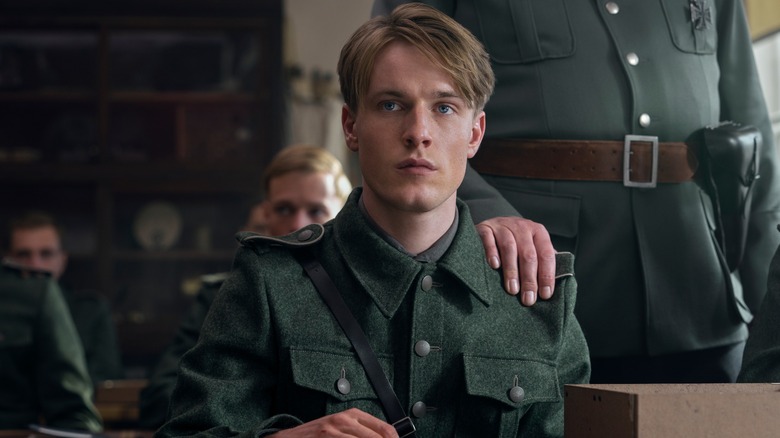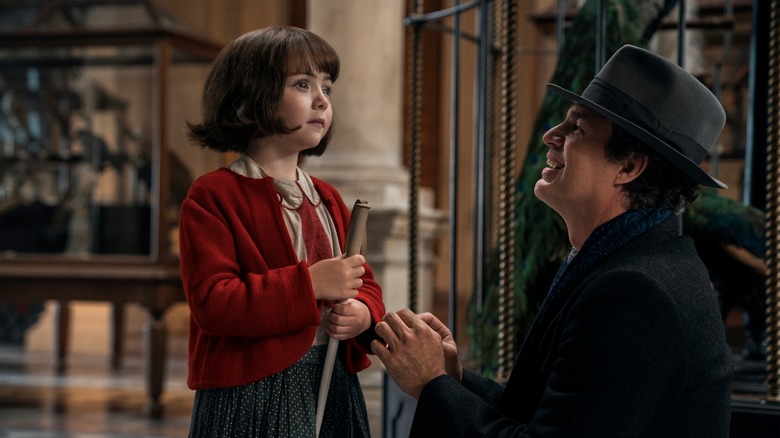All The Light We Cannot See Review: A Rushed And Mawkish Adaptation
- Interesting premise that feels different than many other WWII films we've seen before
- Likable lead characters
- Some unfortunate acting choices
- Too much is crammed into four episodes
War makes for strange bedfellows, or so the saying goes. But the beauty — and tragedy — of Anthony Doerr's Pulitzer Prize-winning novel "All the Light We Cannot See" is that in spite of everything, the instant connection between Marie-Laure, a blind girl from Paris, and Werner, a young German radio operator, could not be more fated. But although the story itself is sweet and incredibly lyrical, a miniseries adaptation of "All the Light We Cannot See" has a lot to live up to — and this one isn't always equal to the task. Compressed into just four episodes, "All the Light We Cannot See" feels rushed and shallow, unable to delve into its layered narrative with any detail. Despite the best efforts of its cast, "All the Light We Cannot See" is a featherweight disappointment.
As the end of World War II approaches, the destiny of two unlikely friends and allies brings them careening toward one another. Marie (Aria Mia Loberti) is a young blind girl who operates a radio out of her great-uncle's attic in the seaside town of Saint-Malo, where she reads passages from "Twenty Thousand Leagues Under the Sea" that contain secret messages to guide Allied bombers to their targets. Werner (Louis Hofmann) is tasked with hunting down her radio broadcast, though its signal is coming from a frequency that provided him comfort and intellectual stimulation during his lonely childhood under the Nazi regime. In these final days of the war, their efforts are devoted entirely to survival, as they face not just the impending destruction of the city, but the malevolent efforts of a Nazi jeweler (Lars Eidinger) who is determined to track down the legendary Sea of Glass diamond and has no scruples about killing anyone who gets in his way.
Translation from page to screen
The novel is an absolutely beautiful piece of writing, but it's almost immediately clear that the miniseries adaptation has some serious problems in execution. After watching even just the first episode, you realize that it suffers from not being able to rely upon Doerr's striking prose — the characters are instead forced to voice what was previously addressed with internal monologue. This leads to some frustratingly melodramatic dialogue that puts too fine a point on the narrative, spelling out things that would otherwise have been elegantly implied.
It's a shame that this miniseries was only given a four-episode run, because it doesn't spend enough time developing Marie and Werner, giving us only a surface-level exploration of, say, Marie's lonely days in Saint-Malo or Werner's horrific experiences at a Nazi boarding school. Instead, it bafflingly gives a disproportionate amount of screentime to the German jeweler, who is a cartoonishly over-the-top villain and the least interesting character in the entire production. We spend so much time with him that Marie and Werner are practically sidelined in their own series. As a result, we don't really get to know them, which limits our ability to care about them as much as we should. It doesn't help that every minute feels rushed, including but not limited to its anticlimactic conclusion.
Mark Ruffalo's accent and other unforced errors
There's also a little matter of the performances, which are ... well, let's just say mixed. Louis Hofmann is very good, especially in his scenes with Felix Kammerer (who you may recognize from "All Quiet on the Western Front"), where the two are engaged in a battle of wits over their respective secrets. He has an obvious intelligence and commanding presence that help bring the character to life, fleshing out all the backstory that time prohibits the miniseries from exploring. Hugh Laurie as a shut-in resistance fighter, Marie's great-uncle Etienne, is surprisingly effective, even if the show's depiction of post-traumatic stress from World War I is a little sanitized.
Other characters don't fare quite as well. Mark Ruffalo as Marie's father is acting so hard it's all we can pay attention to whenever he's on screen, and whoever approved his ridiculously distracting accent did not have the best interests of the show at heart. As Marie, Aria Mia Loberti is sweet and charming, but the fact that this is her first-ever acting role definitely shows — there's a lack of depth to the character that a more seasoned performer might have been able to bring to the table.
There's plenty to like about "All the Light We Cannot See." It has a hazy, dreamlike quality that makes it feel like a 20th-century fairy tale, with the gallant knight rescuing the princess from the tower. Werner may be the prototypical "good German," but there's nuance to his character that prevents him from becoming a cliche. In spite of any inherent weaknesses in the adaptation, you can't help but root for the likable main characters — it's just a shame that this miniseries isn't able to capture more of what made the original novel so tragically beautiful.
"All the Light We Cannot See" premieres on Netflix on November 2.


